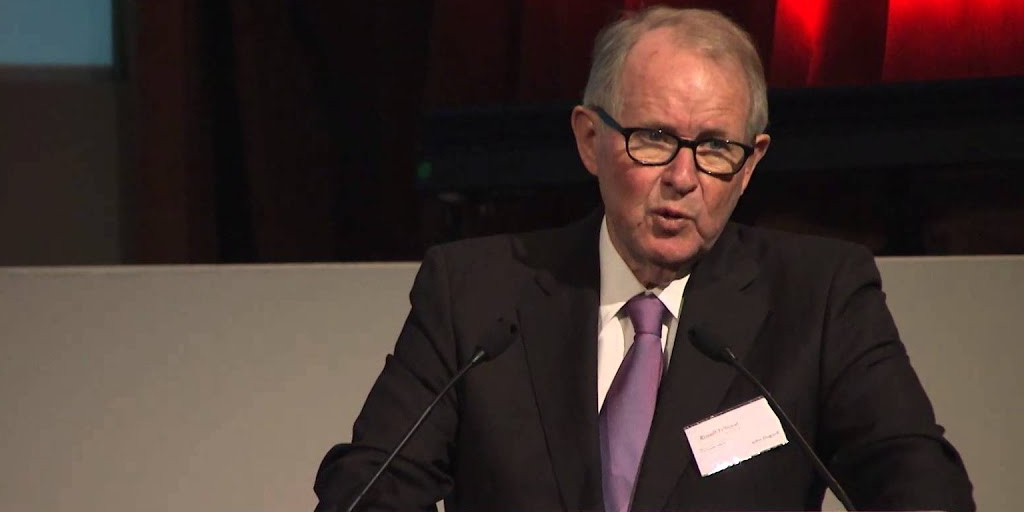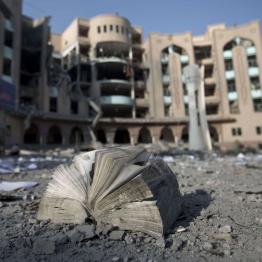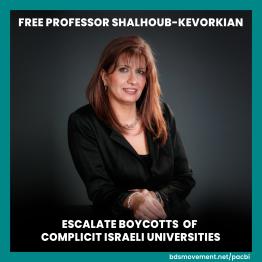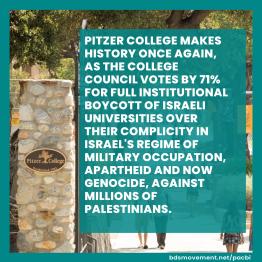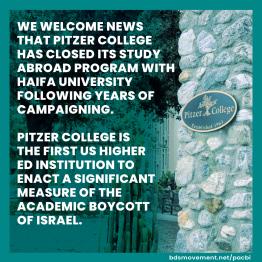Opinion by Legal Scholar Prof. John Dugard on Relations Between University of Cape Town and Israeli Universities
OPINION ON RELATIONS BETWEEN UCT AND ISRAELI UNIVERSITIES
1. The Senate and Council of the University of Cape Town will soon consider the following proposal:
UCT not enter into formal relations with Israeli Universities operating in the Occupied Palestinian Territories, or any other University enabling the gross violation of human rights in the Occupied Palestinian Territories
I am asked to advise whether such a resolution is lawful under international law, the South African Constitution and South African law.
2. This request raises four questions
(a) Whether Israel universities operating in the Occupied Palestinian Territories (OPT) are lawful under international law.
(b) Whether such universities are lawful under the South African Constitution.
(c) Whether universities in Israel itself enable the gross violation of human rights in the OPT in violation of international law.
(d) Whether the South African Constitution or law contain any provisions of relevance to (c) if Israeli universities enable the gross violation of human rights.
A. Whether Israeli Universities operating in the OPT are lawful under international law
There is only one Israeli university in the OPT – the University of Ariel, situated in the Israeli settlement of Ariel. Whether this University operates lawfully in the OPT must be considered in the context of the lawfulness of Israeli settlements in the West Bank, which Israel prefers to call Judea and Samaria.
There is no doubt that Israeli settlements in the West Bank of the OPT are unlawful under international law. This clear from international treaties, resolutions of the UN Security Council and General Assembly, an advisory opinion of the International Court of Justice, an International Fact-Finding Mission established by the UN Human Rights Council, decisions of the International Committee of the Red Cross (ICRC) and the practice of States.
(i) The Fourth Geneva Convention Relative to the Protection of Civilian Persons in Time of War of 1949 provides in Article 49(6) that “ The Occupying Power shall not …transfer parts of its own civilian population into the territory it occupies.” According to the Commentary on this provision, it is intended to prohibit the transfer into an occupied territory of portions of the population of the occupying power “for political or racial reasons or in order… to colonize those territories”.[1] This practice is defined as a war crime by Article 85(4) of the Additional Protocol to this Convention of 1977. The Rome Statute of the International Criminal Court of 1998 includes “The transfer, directly or indirectly, by the Occupying Power of parts of its own civilian population into the territory it occupies” among its list of war crimes.[2]
(ii) The Security Council of the United Nations in Resolution 2334 of December 2016 condemned Israeli settlements as having “no legal validity” and as a flagrant violation of international law. This resolution was adopted by 14 votes to one with the USA abstaining.[3] The General Assembly has likewise condemned Israeli settlements as unlawful in many resolutions.[4]
(iii) In 2004 the International Court of Justice unanimously held that Israeli settlements in the West Bank and East Jerusalem had been established in violation of international law.[5]
(iv) In 2013 an Independent Fact-Finding Mission established by the UN Human Rights Council found that settlements are illegal and that they are responsible for “daily violations of a multitude of the human rights of the Palestinians in the OPT, including , incontrovertibly, violating their right to non-discrimination, equality before the law and the equal protection of the law”.[6]
(v) In 1981 the International Conference of the Red Cross reaffirmed that settlements in occupied territory are incompatible with Article 49 of the Fourth Geneva Convention. Subsequent resolutions of the International Committee of the Red Cross have confirmed this.
On the basis of these decisions and the practice of States, as evidenced in their military manuals, legislation and official statements, the authoritative study of the ICRC on Customary International Humanitarian Law, declares that State practice establishes the rule that States may not transfer parts of their own civilian population into a territory they occupy as “a rule of customary international law applicable to international armed conflicts”.[7]
The above evidence establishes clearly that Israeli settlements in the West Bank and East Jerusalem are unlawful. The inevitable consequence is that the University of Ariel, situated in a settlement, is part of an illegal and criminal enterprise under international law.
Article 25(3)(c) of the Rome Statute provides that a person shall be criminally liable if “for the purpose of facilitating the commission of a crime” he or she “aids, abets or otherwise assists in the commission” of a crime provided for in the Statute, including war crimes.
B Whether the University of Ariel is lawful under South African Law
Settlements such as Ariel are unlawful under South Africa law on two grounds.
First, because Section 232 of the South Africa Constitution 108 of 1966 provides that “customary international law is law in the Republic unless it is inconsistent with the Constitution or an Act of Parliament.” As shown above, the prohibition on the transfer of civilians of the occupying power into an occupied territory is a rule of customary international law. Consequently Israeli settlements such as Ariel are established in violation of a rule of international law applicable in South Africa.
Second, because the Rome Statute has been incorporated into South African Law by the Implementation of the Rome Statute of the International Criminal Act 27 of 2002. This Act criminalizes war crimes as defined in the Rome Statute in Part 3 of Schedule 1. This includes the definition of the war crime of transferring civilians of the occupying power into the occupied territory.[8] Section 3 of the Act declares that the object of the Act is to “create a framework to ensure that the Statute is effectively implemented in the Republic”.
Consequently, the University of Ariel, situated in an illegal settlement and designed to enhance the stature and credibility of an illegal enterprise, is an i
Illegal institution under both international law and South African law.
If the University of Cape Town entered into any relationship with Ariel it might face criminal responsibility as an aider or abetter. Such a crime might be prosecuted before a South African court in terms of the Implementation of the Rome Statute of the International Criminal Court Act 27 of 2002.
C Whether Universities in Israel enable the gross violation of human rights in the OPT in violation of international law
(i) Israel’s gross violation of human rights
It is impossible to answer this question without saying something, however briefly, about Israel’s human rights record in order to provide context for the question posed.
Israel has committed and continues to commit gross violations of international human rights law and international humanitarian law. Israel is in violation of most of the human rights treaties and international humanitarian law treaties to which it is a party. The evidence of the violation of these conventions and customary international law is clear. The past twenty years have witnessed an explosion of inter-governmental and non-governmental fact-finding missions, media coverage and video recordings which have laid bare Israel’s conduct in the OPT. It is impossible for Israel to refute many of the allegations made against it or to deny the authenticity of the statistics of its wrongdoing.
(a) The Convention on the Elimination of All Forms of Racial Discrimination,1965 , prohibits racial discrimination and apartheid
There is blatant discrimination in favour of the 600,000 to 700.000 Israeli settlers in the West Bank and East Jerusalem and against the Palestinians. This is apparent in restrictions of movement placed on Palestinians but not settlers; the authorization to build houses; family unification; the allocation of water; the administration of criminal justice, where settlers are tried before civil courts in Israel and Palestinians are tried before military courts, presided over by military judges applying rules that fail to meet the standards of due process of law. These discriminatory measures create a system similar to that of apartheid South Africa. In consequence Palestine has referred these practices to the International Criminal Court as constituting the crime of apartheid, recognized by the Rome Statute as a form of crime against humanity.[9] Palestine has also brought an inter - State complaint against Israel before the monitoring committee of the Convention on the Elimination of All Forms of Racial Discrimination in which it alleges gross discrimination and practising apartheid. Both these complaints are still being considered by the respective bodies.
(b) The International Convention on Civil and Political Rights of 1966, and the Convention against Torture of 1984, together guarantee such rights as the right to life, freedom from torture and inhumane, degrading and cruel treatment, freedom from arbitrary arrest and punishment, due process of law and the right to family life.
Israel has been responsible for the indiscriminate killing of thousands of Palestinian civilians, particularly in its attacks on Gaza in 2008-2009 (Operation Cast Lead) and 2014( Operation Protective Edge) and more recently in its shooting of peaceful demonstrators on the Gaza border. In 2018 over 300 Palestinians were killed and over 31,000 (including over 6,000 children) wounded , mainly by Israeli snipers at the Gaza border. Torture and the inhumane and degrading treatment of Palestinian prisoners is rife. Some 6,000 Palestinians are imprisoned each year for political offences following trial before military courts that fail to comply with international fair-trial standards. At present over 400 Palestinians are held in administrative detention - that is detention without trial. Family life is severely undermined by the demolition of houses. In 2018, 475 homes were demolished for having been built without permits – and permits to build houses are routinely refused by Israeli authorities.[10]
(c) Convention on the Rights of the Child, 1989
The education of children is seriously disrupted by raids carried out by the Israel Defense Forces (IDF), the demolition of schools built without permits and the refusal to allow new schools to be built. In 2018 57 children were killed and 6, 473 wounded by the IDF and settlers.[11] Most of the children killed were killed by snipers who targeted children at the weekly Gaza Great Return March protests. According to the Report of the Independent International Commission of Inquiry on the protests in the OPT, “Israeli security forces used lethal force against children who did not pose an imminent threat of death or serious injury to soldiers.”[12]
(d) International humanitarian law, comprising both conventional rules contained in the Fourth Geneva Convention and customary international law
Israel’s occupation of the OPT is governed by the Fourth Geneva Convention of 1949 which lays down rules for the administration of occupied territories. Israel has seriously violated these rules by colonizing the West Bank and East Jerusalem with a settlement enterprise of some 700, 000 settlers, which, in the words of Israeli scholar Aeyal Gross “have led to the dispossession of Palestinians and to discrimination against them, and are emblematic of Israel’s breach of trust entailed in the normative regime of occupation.”[13] Other violations of these rules result from the implementation of a system of apartheid in the OPT; the imposition of a blockade on Gaza; and the unlawful de jure annexation of East Jerusalem and de facto annexation of some ten per cent of Palestinian land by the construction of a wall within Palestinian territory.
Customary international humanitarian law binding on Israel prohibits the indiscriminate and excessive use of force against civilian targets. As shown above, Israel has killed and wounded thousands of civilians in its attacks against Gaza and in its military operations in the West Bank.
(ii) Do Israeli universities enable the gross violations of human rights in the OPT?
To “enable” someone or some institution to do something is make it possible for him or her to do something, to empower someone to do something. It is a non- legal term which appears to have a lower threshold than aiding or abetting, the legal term used to denote assistance in the commission of a crime.
It is difficult to give a purely legal answer to this question. Inevitably the question of the participation of Israeli universities in gross human rights violations in the OPT or the extent to which they “enable” such violations is a question for moral judgment and legal reasoning. Moreover, it requires more factual knowledge than I have at my disposal.
In considering whether Israeli universities enable the gross violation of human rights it is useful to distinguish between enabling the existence of Ariel university and enabling the gross violation of human rights of the kind listed above in C(i)(a)-(d).
(a) Do Israeli universities enable the existence of Ariel University?
I have too little information to make a considered judgment on this matter. Ariel University was initially established in 1982 by the University of Bar Ilan in Israel, but in 2004 Ariel University became independent, obtaining full academic status in 2012. It is possible that some links still remain between Bar Ilan University and Ariel University. However, it is significant that Council of Presidents of Israeli Universities condemned the granting of university status to Ariel University. There is also evidence that a considerable number of Israeli university academics have decided to boycott Ariel University. Moreover, the Council for Higher Education of Israel opposed – unsuccessfully - the decision to allow Ariel to establish a medical school. On the other hand, conferences are held in Ariel university and one assumes that there are teaching and research ties between Ariel and Israeli universities of the kind that characterized relations between UCT and its staff with universities set up in furtherance of the policy of apartheid during the apartheid years.
(b) Do Israeli universities enable the commission of gross human rights in the OPT?
There is no geographical distance between Israel and the occupied Palestinian territories of East Jerusalem, West Bank and Gaza. Every day thousands of Palestinian workers commute to Israel. Thousands of Israelis live or reside in the OPT, as settlers, officials or soldiers. Israel has unlawfully annexed East Jerusalem and regards it as an integral part of Israel. Israelis in Tel Aviv may pretend that they are separated from the OPT in the same way that white South Africans during the apartheid era pretended they had no connection with the black townships or Bantustans. However, the presence of some 700,000 Israeli settlers in the OPT serves to emphasize the closeness between Israel and the OPT. This closeness is given constitutional form by the Nation State law adopted by Israel in 2018 which provides that “the State [of Israel] views the development of Jewish settlement as a national value and will act to encourage and promote its establishment and consolidation.” Recently, Prime Minister Nethanyahu has promised to annex both the Jordan Valley and settlements in the OPT.
Israeli universities may not directly assist in the commission of gross human rights violations in the OPT but it is difficult to resist the conclusion that they do empower and enable the commission of such acts. Scientists from Israeli universities (and possibly university laboratories) carry out research for Israel Aerospace Industries (which manufactures drones used in Gaza) and other industries used by the military in the suppression of human rights. Engineers from Israeli universities are responsible for building separate roads for the convenience of settlers in the OPT. Architects design houses in the settlements. Lawyers serve as military court judges in the courts of the OPT. Graduates serve as members of the Knesset and participate in the adoption of laws that suppress Palestinians in the OPT. University graduates and staff members have in all probability served as reservists in the IDF and been party to the commission of human rights violations by the IDF. And so on.
In answering the question whether Israeli universities enable the commission of gross human rights in the OPT it would be helpful for the University of Cape Town to ask whether it indirectly enabled the gross commission of human rights in apartheid South Africa in the same way?
Of course, there is a difference. The University of Cape Town (and the University of the Witwatersrand) took steps to publicly dissociate itself by institutionally condemning apartheid. University assemblies comprising students, staff, administrators and workers regularly and publicly condemned apartheid. Moreover, students protested vigorously against apartheid. There was an ongoing tension between the apartheid regime and the University of Cape Town because of its opposition to apartheid. There is no evidence that Israeli universities have taken steps as institutions to condemn the occupation and the gross violation of human rights committed by Israel in the OPT. There is little evidence of student protest of the kind that characterized student life at UCT during the apartheid years.
D Are there any provisions in the South African Constitution or South African law of relevance to Israel’s gross violation of human rights?
There is nothing in South African law which might be construed as preventing UCT from deciding not to enter into relations with Israeli universities. On the contrary, such a decision would accord with both the South African Constitution and South African law.
The Bill of Rights in the South African Constitution (sections 7 to 39) protects the basic human rights contained in international human rights conventions. These include equality before the law, the right to life, freedom from arbitrary arrest and detention without trial, freedom from torture and cruel, inhuman and degrading treatment, freedom of expression, assembly and association, children’s rights, the rights to health care, food, water and education, the right to a fair trial, the right not to have one’s home demolished.
These rights are reaffirmed in the Convention on the Elimination of All Forms of Racial Discrimination, the International Covenant on Civil and Political Rights, the International Covenant on Economic, Social and Cultural Rights and the Convention on the Rights of the Child which are binding on both South Africa and Israel.[14]
As shown above, Israel is seriously in violation of these human rights conventions.
At the international level South Africa is entitled to hold Israel accountable for its violation of the principal human rights conventions. It has done so by voting in favour of resolutions in the UN General Assembly condemning Israel’s violation of human rights.
At the national level officials are obliged not to engage in conduct that undermines South Africa’s international obligations or weakens compliance with the Bill of Rights in the South Africa Constitution.
See Law Society of South Africa v President of the Republic of South Africa and Others, 2019(3) South African Law Reports 30 (Constitutional Court), paras 3-5, 75, 76-78, 91.
Moreover, officials must not engage in action that undermines not only the rights of South Africans protected by international treaties but also the rights of other nationals protected by such treaties.
See Law Society v President of the RSA above paras 29,81.
If South African officials are obliged to uphold the international obligations of South Africa and the Bill of Rights it follows that a South African institution - in casu the University of Cape Town – would be acting in accordance with South African law if it were to take a decision to uphold South Africa’s international obligations and the Bill of Rights in its relations with universities in a country that egregiously violates human rights.
South African law confirms this conclusion. South Africa is a party to the Rome Statute of the International Criminal Court, which has been incorporated into South African law by the Implementation of the Rome Statute of the International Criminal Court Act 27 0f 2002, This statute criminalizes crimes against humanity and war crimes as defined in the Rome Statute.[15]
The Statute of the International Criminal Court includes in its definition of crime against humanity the crime of apartheid. This crime is defined as inhumane acts involving murder, extermination, forcible population transfer, arbitrary imprisonment, torture and persecution on racial grounds committed in the context of an institutionalized regime of systematic oppression and domination by one racial group over another with the intention of maintaining that regime.[16] The definition of war crime includes the establishment of settlements for part of the civilian population of an occupying power in an occupied territory.[17]
Israel’s extensive settlement enterprise in the West Bank and East Jerusalem is responsible for the establishment of a system of apartheid in which settlers and the IDF are responsible for committing inhumane acts against Palestinians in the context of an institutionalized regime of systematic oppression. It therefore constitutes the crime of apartheid as a species of crime against humanity – which is presently being considered by both the International Criminal Court and the monitoring body of the Convention on the Elimination of All Forms of Racial Discrimination.
Israel’s settlement enterprise also constitutes a war crime. See above A (i) to (v).
In terms of South African law – the Implementation of the Rome Statute of the International Criminal Court Act - a person responsible for establishing settlements in the West Bank or East Jerusalem, or aiding and abetting this enterprise, may be charged with having committed a crime against humanity or war crime in South Africa. In these circumstances the University of Cape Town would act in accordance with South African law if it distanced itself from such criminal acts.
JOHN DUGARD SC
The Hague, 12 September 2019.

